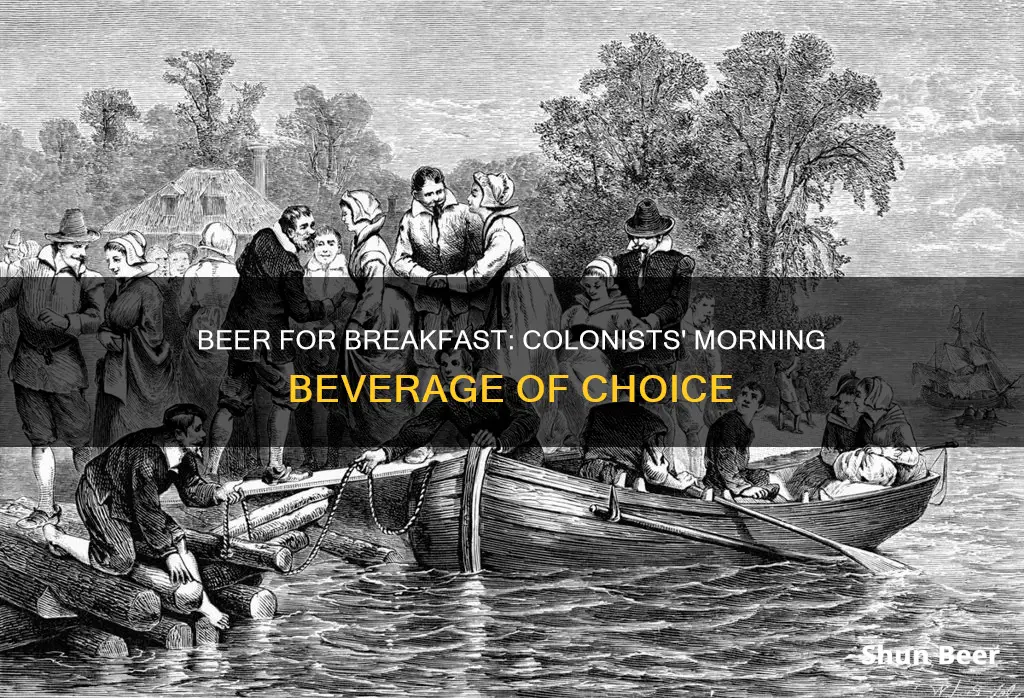
Drinking beer for breakfast was commonplace in colonial America. In fact, it was typical to drink beer throughout the day, from morning to night. This was partly because water was often contaminated and unsafe to drink, and so beer or cider was considered a safer alternative. Beer was also believed to be a healthy substitute for water, and drinking lukewarm alcohol in hot weather was thought to be healthier than drinking cold water. Beer was also seen as a food and a sign of social status, and it was a way to put in a full day's work.
The colonists' beer-drinking habits were also influenced by their English heritage. The Pilgrims, for example, chose to make landfall at Plymouth Rock due to a dwindling beer supply, and they shared their beer recipe with the Native Americans, who were already brewing their own beer using maize, birch sap, and water. The English custom of drinking beer was so ingrained that one of the first structures erected in new settlements was often a brewhouse.
Beer was consumed by all members of colonial society, including infants and nursing mothers, and it was a common drink across different social classes, from farmers and laborers to merchants and lawyers. It was also enjoyed by the Founding Fathers, including George Washington, Thomas Jefferson, and Benjamin Franklin, who were known to be lovers of beer and other alcoholic beverages.
| Characteristics | Values |
|---|---|
| Why did colonists drink beer? | Drinking water was unsafe and could make people ill. Beer was seen as a healthy substitute. |
| Who drank beer? | Everyone, including infants, children, and nursing mothers. Servants and slaves were given weak beer as part of their daily ration. |
| When did they drink beer? | At all times of the day, including before breakfast. |
| What did beer taste like? | Bitter, due to the large number of hops used in brewing. Flavours varied from batch to batch due to a high rate of infection. |
| What was beer served in? | Leather, pewter or earthenware mugs or tankards. Later, beer was served in glasses. |
| Who were prominent beer drinkers? | The Founding Fathers, including George Washington, Thomas Jefferson, Benjamin Franklin, and John Adams. |
What You'll Learn

Beer was safer to drink than water
Drinking beer was safer than drinking water in the colonial era. This was because water was often contaminated and unsafe to drink. Beer, on the other hand, was considered a healthy substitute for water. The boiling process of brewing beer neutralised most of the tainted water's harmful effects, although people did not yet understand the connection between boiling and sanitation.
The Pilgrims, for example, chose to make landfall at Plymouth Rock due to a dwindling beer supply. They had initially planned to settle in a location with rich farmland and a temperate climate, but their beer supply was running low, so they were forced to make an early landing. This demonstrates how important beer was to the colonists—even influencing their choice of settlement location.
The belief that water was unsafe to drink was so widespread that even children drank beer instead. Beer was also recommended for nursing mothers. It was considered a food and a sign of social status, with only the most destitute drinking water. Beer was consumed throughout the day, from early morning to bedtime, and was seen as a way to stay hydrated.
The English heritage of the colonists also played a role in their preference for beer over water. Beer was a familiar beverage to them, and they brought their brewing traditions and customs with them to the New World. In fact, brewing beer was often one of the first structures erected in new settlements, and brewers were highly sought-after skilled workers.
In addition to being safer than water, beer also had economic and social benefits for the colonies. The establishment of taverns, where alcohol was consumed and sold, played a vital role in colonial life. Taverns served as community centres, providing a place for social gatherings, political discussions, and the administration of law. They facilitated trade and encouraged travel to undeveloped areas, stimulating the economy and promoting social interaction.
Overall, beer was considered a necessary and integral part of daily life in colonial America, and its consumption was influenced by a combination of health, cultural, and social factors.
Beer Expiration: Is It Safe to Drink?
You may want to see also

Beer was considered a food
The colonists' affinity for beer can be traced back to their English heritage, where drinking water was also frowned upon due to poor sanitary standards. When the English colonists arrived in North America, they brought their customs and habits with them, including their love for beer. Beer was so important to the colonists that they often erected a brewhouse as one of their first structures in new settlements.
Beer was consumed by everyone in colonial society, from infants to nursing mothers, farmers, laborers, merchants, lawyers, and craftsmen. It was considered a democratic beverage that spanned generations and social classes. Beer was also used as a form of payment for servants and slaves, who were given weak beer as part of their daily ration.
The ingredients for beer in colonial America varied depending on what was available. While barley was the preferred grain for beer, brewers often had to substitute it with other ingredients such as pumpkin, molasses, spruce, and pine. Beer was typically consumed from leather, pewter, or earthenware mugs or tankards, although glassware became more common as lighter, pale ales gained popularity.
The role of beer as a food and a staple in colonial society extended beyond mealtimes. Beer played a significant part in the social and economic life of the colonies, with taverns serving as centers of commerce, social gatherings, and even court proceedings. Beer was also used to encourage militia members to participate in training days, with free ale provided as an incentive.
Overall, beer was an integral part of daily life in colonial America, and its consumption was deeply rooted in the cultural and social norms of the time.
Beer and Knee Pain: Is There a Link?
You may want to see also

Beer was a sign of social status
Beer was also a marker of social status—the more beer one drank, the higher their status. Tavern owners enjoyed higher social status than clergy during the colonial era. Taverns were the centre of civic life, and beer was a common thread in everyone's lives.
The act of drinking beer was also tied to social norms of the time. Drinking alcohol was a means of survival, and it was customary to drink at every halt during a journey. Beer was also consumed before, during, and after meals.
The taste and quality of beer varied greatly from batch to batch due to a high rate of infection in the brew. Beer was consumed from leather, pewter, or earthenware mugs or tankards, and later, from glasses as lighter, pale ales became more common.
The production of beer was also influenced by the lack of a monetary system in the colonies, which hindered commercial production. However, the establishment of taverns and the development of a barter system, where farmers could trade produce for beer, helped to stimulate the economy and encourage trade.
The role of beer in colonial America extended beyond a simple beverage—it was a marker of social status, a means of survival, and a catalyst for social and economic development.
Beer and Gum Grafts: What You Need to Know
You may want to see also

Beer was consumed from leather, pewter or earthenware mugs
In the early 18th century, beer was consumed from leather, pewter, or earthenware mugs or tankards. These mugs were preferred over glasses as the beer was not "very pretty" and hence not suitable to be served in a glass. Beer was also consumed from waxed leather tankards known as "black jacks".
Leather, pewter, and earthenware mugs were used in the early 18th century as beer was often bitter due to the large quantities of hops used, which acted as a preservative. However, as the century progressed, lighter, pale ales became more common, and Americans began to drink beer from glasses.
The taste of beer varied greatly from batch to batch in the 18th century as brewers had not yet learned about microbes that could spoil the beer and cause it to taste sour or "skunky". Modern production methods were not available, so beer drinkers expected peaks and valleys in quality.
Beer and Gallstones: What's the Connection?
You may want to see also

Beer was a staple in the colonial diet
The English heritage of the colonists played a significant role in the prevalence of beer drinking. The Pilgrims, who landed at Plymouth Rock due to dwindling beer supplies, prioritized brewing beer as one of their first tasks upon establishing new settlements. Beer was so highly valued that brewers were among the earliest recruits in new colonies. Beer was consumed by all members of colonial society, from infants to nursing mothers, farmers, laborers, merchants, lawyers, and craftsmen.
Beer was initially brewed at home, with most households adding a small brew room to their living quarters. However, as the colonies began exporting goods to England, commercial breweries began to emerge, further stimulating the economy and encouraging trade.
The drinking of beer was also closely tied to the development of taverns, which served as social, legal, and commercial centers in colonial communities. Taverns were often used for political gatherings, and the founding fathers, including Benjamin Franklin, Thomas Jefferson, and George Washington, were all known to be lovers of beer.
In addition to traditional British-style ales, colonial Americans also brewed beer using local ingredients such as maize, birch sap, pumpkin, spruce, molasses, and sassafras. Beer was typically consumed from leather, pewter, or earthenware mugs, although the introduction of lighter, pale ales led to the use of drinking glasses.
Overall, beer played a significant role in the daily lives of colonists, shaping their social, economic, and political interactions and contributing to the development of early American society.
Beer and Passover: What's Allowed?
You may want to see also
Frequently asked questions
Yes, colonists drank beer for breakfast. In fact, it was common for drinking to begin even before breakfast and continue throughout the day. Beer was considered a food and a sign of social status.
Colonists drank beer for breakfast because water was often contaminated and unsafe to drink. Beer was seen as a healthy substitute for water.
Colonial beer would have tasted bitter, similar to modern India pale ales, due to the large amount of hops used as a preservative. However, flavours varied greatly from batch to batch due to a high rate of infection.
In the early 18th century, most beer was consumed from leather, pewter or earthenware mugs or tankards. As the century progressed, lighter, pale ales became more common and colonists began drinking beer from glasses.
Yes, the Founding Fathers drank beer. George Washington was a fan of porter beer, while Thomas Jefferson preferred pale or wheat ale.







